Copyright, Musical Creativity, and Piracy in the Music Industry
VerifiedAdded on 2022/08/26
|5
|1247
|27
Essay
AI Summary
This essay delves into the intricate relationship between copyright and musical creativity within the music industry. It examines how copyright laws, intended to protect intellectual property, can sometimes hinder the creative process by limiting access to samples and influencing the ability to create derivative works. The essay also addresses the ongoing battle against music piracy, exploring how copyright has been both effective and ineffective in curbing illegal activities. It discusses the challenges posed by internet piracy, the awareness of copyright laws, and the limitations of international legal frameworks. The essay concludes by advocating for newer and more effective copyright laws to foster creativity and combat piracy, recognizing the evolving landscape of music production and consumption.
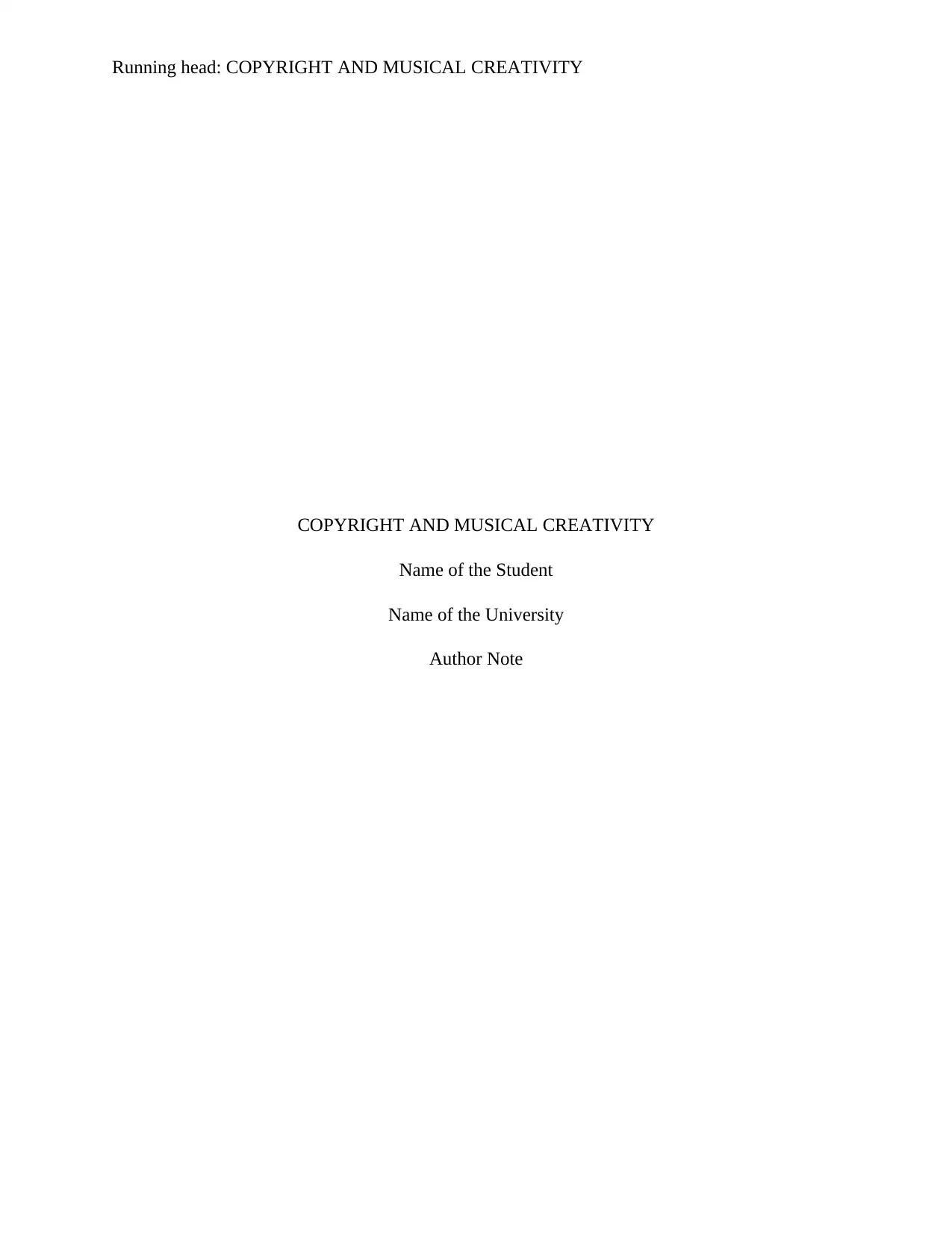
Running head: COPYRIGHT AND MUSICAL CREATIVITY
COPYRIGHT AND MUSICAL CREATIVITY
Name of the Student
Name of the University
Author Note
COPYRIGHT AND MUSICAL CREATIVITY
Name of the Student
Name of the University
Author Note
Paraphrase This Document
Need a fresh take? Get an instant paraphrase of this document with our AI Paraphraser
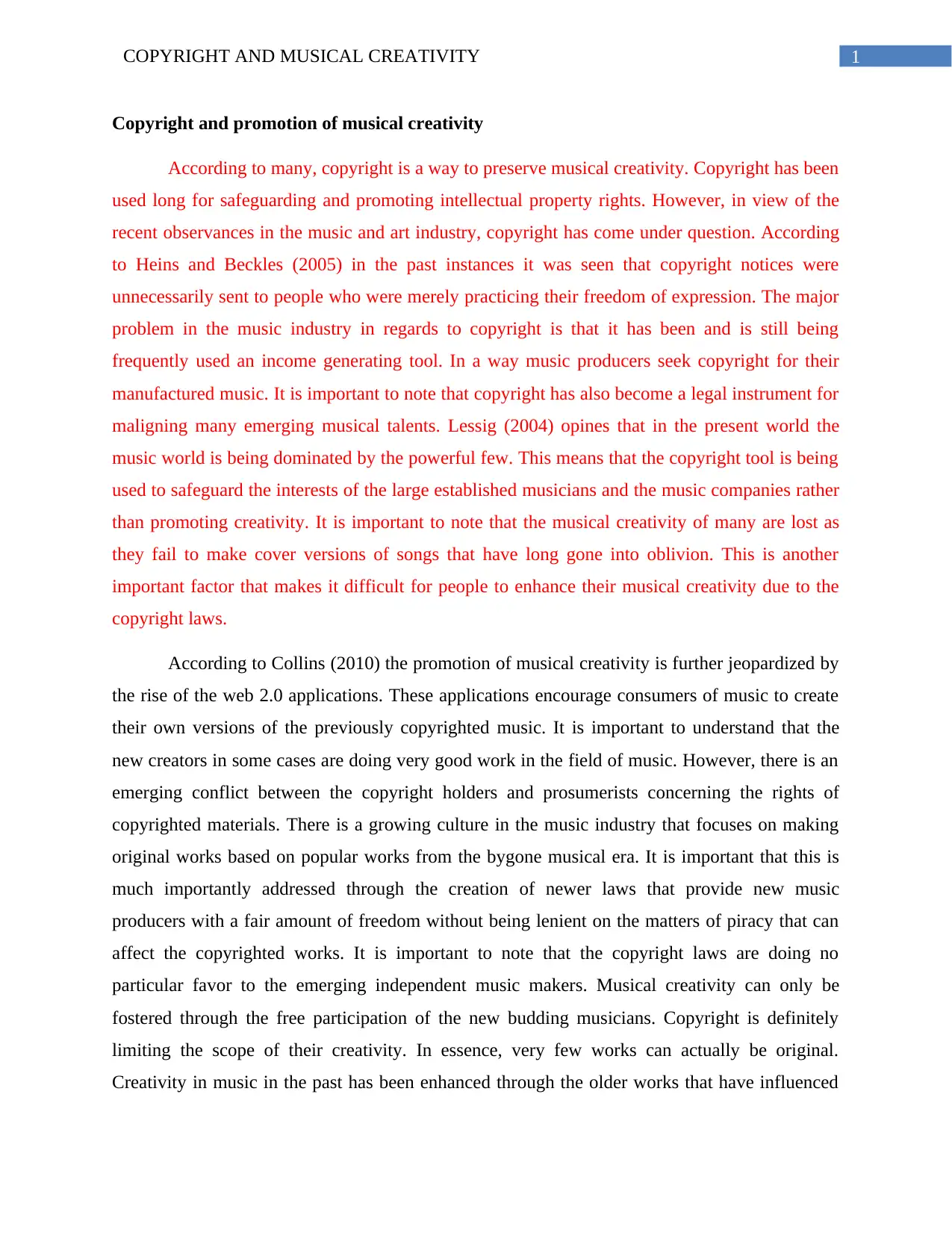
1COPYRIGHT AND MUSICAL CREATIVITY
Copyright and promotion of musical creativity
According to many, copyright is a way to preserve musical creativity. Copyright has been
used long for safeguarding and promoting intellectual property rights. However, in view of the
recent observances in the music and art industry, copyright has come under question. According
to Heins and Beckles (2005) in the past instances it was seen that copyright notices were
unnecessarily sent to people who were merely practicing their freedom of expression. The major
problem in the music industry in regards to copyright is that it has been and is still being
frequently used an income generating tool. In a way music producers seek copyright for their
manufactured music. It is important to note that copyright has also become a legal instrument for
maligning many emerging musical talents. Lessig (2004) opines that in the present world the
music world is being dominated by the powerful few. This means that the copyright tool is being
used to safeguard the interests of the large established musicians and the music companies rather
than promoting creativity. It is important to note that the musical creativity of many are lost as
they fail to make cover versions of songs that have long gone into oblivion. This is another
important factor that makes it difficult for people to enhance their musical creativity due to the
copyright laws.
According to Collins (2010) the promotion of musical creativity is further jeopardized by
the rise of the web 2.0 applications. These applications encourage consumers of music to create
their own versions of the previously copyrighted music. It is important to understand that the
new creators in some cases are doing very good work in the field of music. However, there is an
emerging conflict between the copyright holders and prosumerists concerning the rights of
copyrighted materials. There is a growing culture in the music industry that focuses on making
original works based on popular works from the bygone musical era. It is important that this is
much importantly addressed through the creation of newer laws that provide new music
producers with a fair amount of freedom without being lenient on the matters of piracy that can
affect the copyrighted works. It is important to note that the copyright laws are doing no
particular favor to the emerging independent music makers. Musical creativity can only be
fostered through the free participation of the new budding musicians. Copyright is definitely
limiting the scope of their creativity. In essence, very few works can actually be original.
Creativity in music in the past has been enhanced through the older works that have influenced
Copyright and promotion of musical creativity
According to many, copyright is a way to preserve musical creativity. Copyright has been
used long for safeguarding and promoting intellectual property rights. However, in view of the
recent observances in the music and art industry, copyright has come under question. According
to Heins and Beckles (2005) in the past instances it was seen that copyright notices were
unnecessarily sent to people who were merely practicing their freedom of expression. The major
problem in the music industry in regards to copyright is that it has been and is still being
frequently used an income generating tool. In a way music producers seek copyright for their
manufactured music. It is important to note that copyright has also become a legal instrument for
maligning many emerging musical talents. Lessig (2004) opines that in the present world the
music world is being dominated by the powerful few. This means that the copyright tool is being
used to safeguard the interests of the large established musicians and the music companies rather
than promoting creativity. It is important to note that the musical creativity of many are lost as
they fail to make cover versions of songs that have long gone into oblivion. This is another
important factor that makes it difficult for people to enhance their musical creativity due to the
copyright laws.
According to Collins (2010) the promotion of musical creativity is further jeopardized by
the rise of the web 2.0 applications. These applications encourage consumers of music to create
their own versions of the previously copyrighted music. It is important to understand that the
new creators in some cases are doing very good work in the field of music. However, there is an
emerging conflict between the copyright holders and prosumerists concerning the rights of
copyrighted materials. There is a growing culture in the music industry that focuses on making
original works based on popular works from the bygone musical era. It is important that this is
much importantly addressed through the creation of newer laws that provide new music
producers with a fair amount of freedom without being lenient on the matters of piracy that can
affect the copyrighted works. It is important to note that the copyright laws are doing no
particular favor to the emerging independent music makers. Musical creativity can only be
fostered through the free participation of the new budding musicians. Copyright is definitely
limiting the scope of their creativity. In essence, very few works can actually be original.
Creativity in music in the past has been enhanced through the older works that have influenced
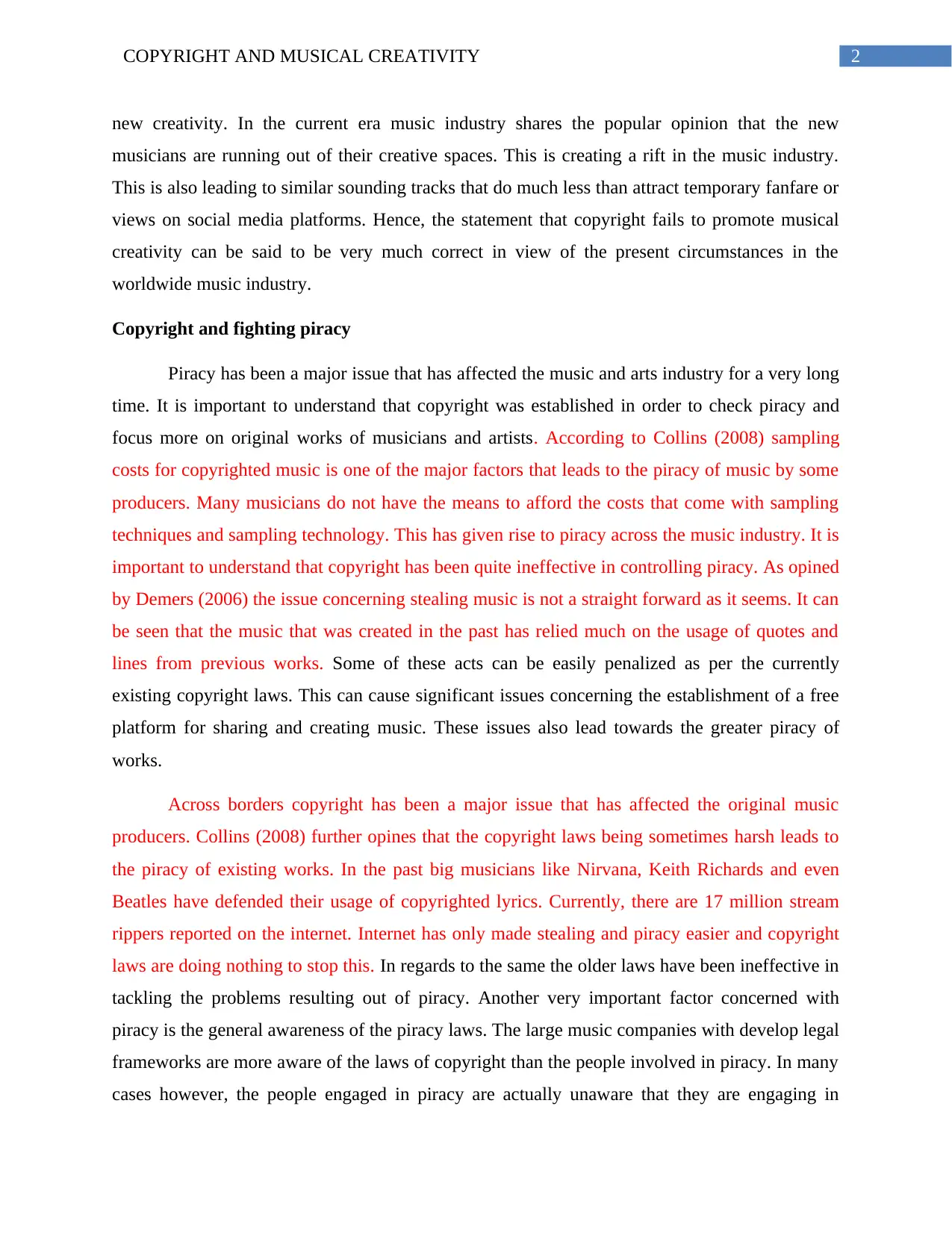
2COPYRIGHT AND MUSICAL CREATIVITY
new creativity. In the current era music industry shares the popular opinion that the new
musicians are running out of their creative spaces. This is creating a rift in the music industry.
This is also leading to similar sounding tracks that do much less than attract temporary fanfare or
views on social media platforms. Hence, the statement that copyright fails to promote musical
creativity can be said to be very much correct in view of the present circumstances in the
worldwide music industry.
Copyright and fighting piracy
Piracy has been a major issue that has affected the music and arts industry for a very long
time. It is important to understand that copyright was established in order to check piracy and
focus more on original works of musicians and artists. According to Collins (2008) sampling
costs for copyrighted music is one of the major factors that leads to the piracy of music by some
producers. Many musicians do not have the means to afford the costs that come with sampling
techniques and sampling technology. This has given rise to piracy across the music industry. It is
important to understand that copyright has been quite ineffective in controlling piracy. As opined
by Demers (2006) the issue concerning stealing music is not a straight forward as it seems. It can
be seen that the music that was created in the past has relied much on the usage of quotes and
lines from previous works. Some of these acts can be easily penalized as per the currently
existing copyright laws. This can cause significant issues concerning the establishment of a free
platform for sharing and creating music. These issues also lead towards the greater piracy of
works.
Across borders copyright has been a major issue that has affected the original music
producers. Collins (2008) further opines that the copyright laws being sometimes harsh leads to
the piracy of existing works. In the past big musicians like Nirvana, Keith Richards and even
Beatles have defended their usage of copyrighted lyrics. Currently, there are 17 million stream
rippers reported on the internet. Internet has only made stealing and piracy easier and copyright
laws are doing nothing to stop this. In regards to the same the older laws have been ineffective in
tackling the problems resulting out of piracy. Another very important factor concerned with
piracy is the general awareness of the piracy laws. The large music companies with develop legal
frameworks are more aware of the laws of copyright than the people involved in piracy. In many
cases however, the people engaged in piracy are actually unaware that they are engaging in
new creativity. In the current era music industry shares the popular opinion that the new
musicians are running out of their creative spaces. This is creating a rift in the music industry.
This is also leading to similar sounding tracks that do much less than attract temporary fanfare or
views on social media platforms. Hence, the statement that copyright fails to promote musical
creativity can be said to be very much correct in view of the present circumstances in the
worldwide music industry.
Copyright and fighting piracy
Piracy has been a major issue that has affected the music and arts industry for a very long
time. It is important to understand that copyright was established in order to check piracy and
focus more on original works of musicians and artists. According to Collins (2008) sampling
costs for copyrighted music is one of the major factors that leads to the piracy of music by some
producers. Many musicians do not have the means to afford the costs that come with sampling
techniques and sampling technology. This has given rise to piracy across the music industry. It is
important to understand that copyright has been quite ineffective in controlling piracy. As opined
by Demers (2006) the issue concerning stealing music is not a straight forward as it seems. It can
be seen that the music that was created in the past has relied much on the usage of quotes and
lines from previous works. Some of these acts can be easily penalized as per the currently
existing copyright laws. This can cause significant issues concerning the establishment of a free
platform for sharing and creating music. These issues also lead towards the greater piracy of
works.
Across borders copyright has been a major issue that has affected the original music
producers. Collins (2008) further opines that the copyright laws being sometimes harsh leads to
the piracy of existing works. In the past big musicians like Nirvana, Keith Richards and even
Beatles have defended their usage of copyrighted lyrics. Currently, there are 17 million stream
rippers reported on the internet. Internet has only made stealing and piracy easier and copyright
laws are doing nothing to stop this. In regards to the same the older laws have been ineffective in
tackling the problems resulting out of piracy. Another very important factor concerned with
piracy is the general awareness of the piracy laws. The large music companies with develop legal
frameworks are more aware of the laws of copyright than the people involved in piracy. In many
cases however, the people engaged in piracy are actually unaware that they are engaging in
⊘ This is a preview!⊘
Do you want full access?
Subscribe today to unlock all pages.

Trusted by 1+ million students worldwide
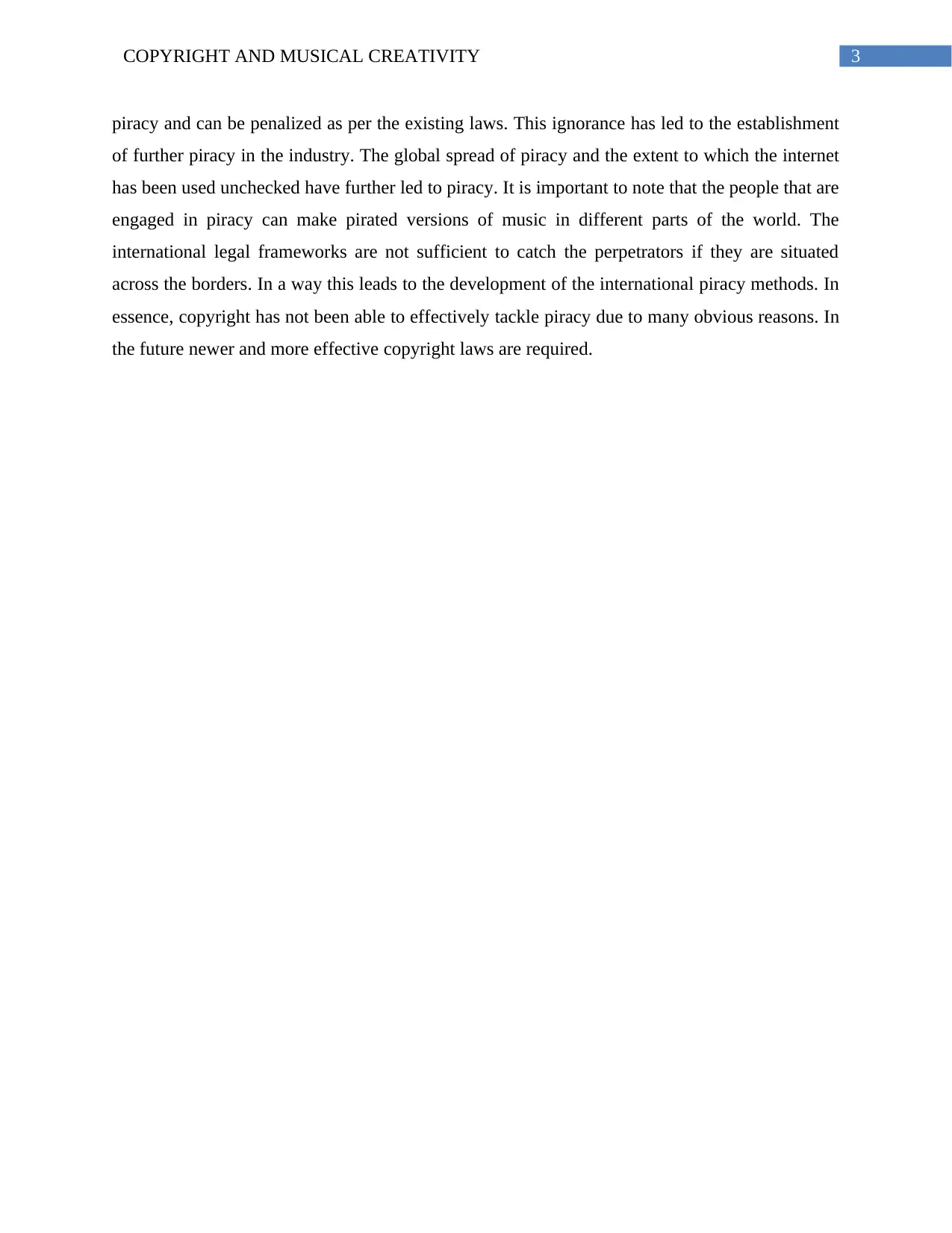
3COPYRIGHT AND MUSICAL CREATIVITY
piracy and can be penalized as per the existing laws. This ignorance has led to the establishment
of further piracy in the industry. The global spread of piracy and the extent to which the internet
has been used unchecked have further led to piracy. It is important to note that the people that are
engaged in piracy can make pirated versions of music in different parts of the world. The
international legal frameworks are not sufficient to catch the perpetrators if they are situated
across the borders. In a way this leads to the development of the international piracy methods. In
essence, copyright has not been able to effectively tackle piracy due to many obvious reasons. In
the future newer and more effective copyright laws are required.
piracy and can be penalized as per the existing laws. This ignorance has led to the establishment
of further piracy in the industry. The global spread of piracy and the extent to which the internet
has been used unchecked have further led to piracy. It is important to note that the people that are
engaged in piracy can make pirated versions of music in different parts of the world. The
international legal frameworks are not sufficient to catch the perpetrators if they are situated
across the borders. In a way this leads to the development of the international piracy methods. In
essence, copyright has not been able to effectively tackle piracy due to many obvious reasons. In
the future newer and more effective copyright laws are required.
Paraphrase This Document
Need a fresh take? Get an instant paraphrase of this document with our AI Paraphraser
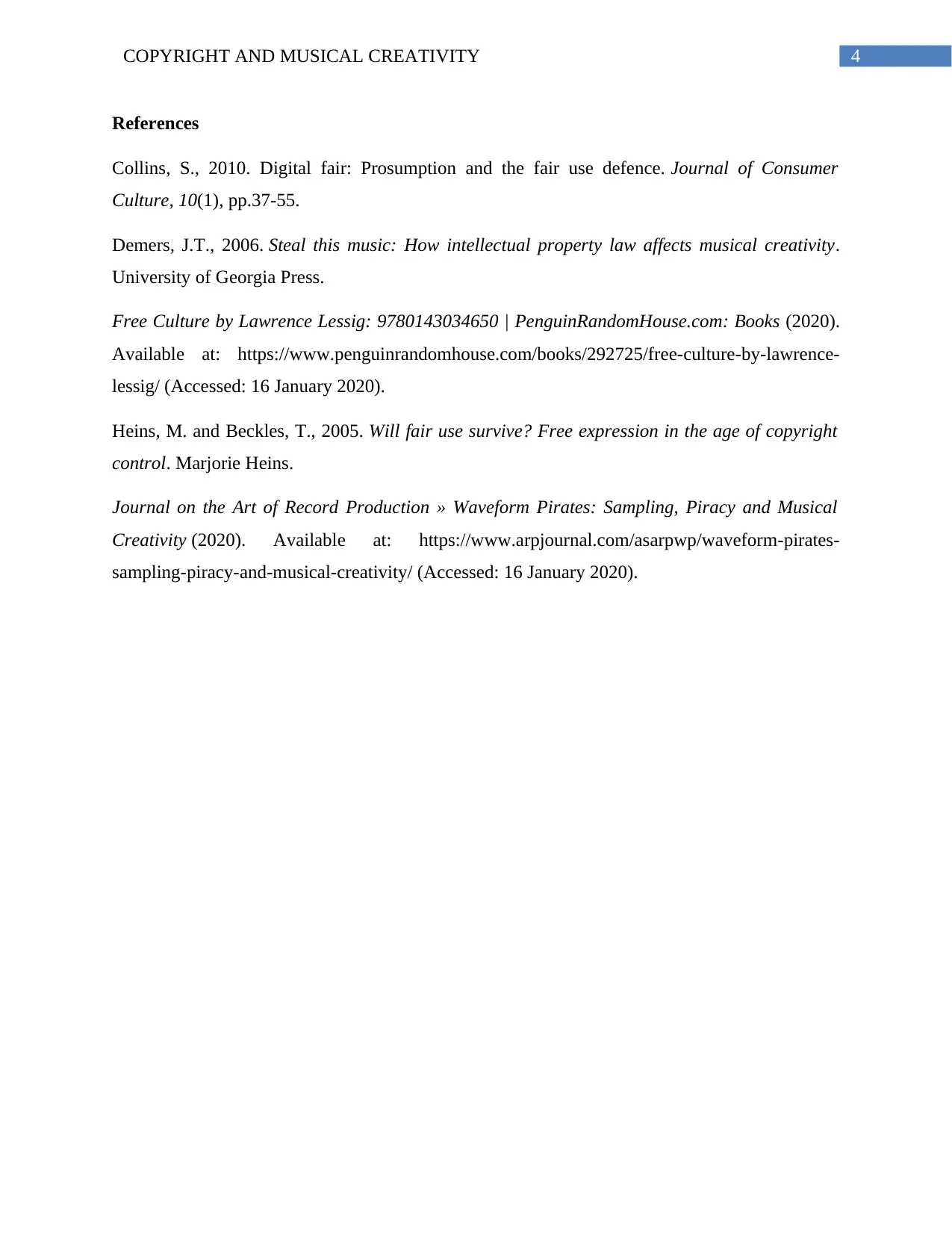
4COPYRIGHT AND MUSICAL CREATIVITY
References
Collins, S., 2010. Digital fair: Prosumption and the fair use defence. Journal of Consumer
Culture, 10(1), pp.37-55.
Demers, J.T., 2006. Steal this music: How intellectual property law affects musical creativity.
University of Georgia Press.
Free Culture by Lawrence Lessig: 9780143034650 | PenguinRandomHouse.com: Books (2020).
Available at: https://www.penguinrandomhouse.com/books/292725/free-culture-by-lawrence-
lessig/ (Accessed: 16 January 2020).
Heins, M. and Beckles, T., 2005. Will fair use survive? Free expression in the age of copyright
control. Marjorie Heins.
Journal on the Art of Record Production » Waveform Pirates: Sampling, Piracy and Musical
Creativity (2020). Available at: https://www.arpjournal.com/asarpwp/waveform-pirates-
sampling-piracy-and-musical-creativity/ (Accessed: 16 January 2020).
References
Collins, S., 2010. Digital fair: Prosumption and the fair use defence. Journal of Consumer
Culture, 10(1), pp.37-55.
Demers, J.T., 2006. Steal this music: How intellectual property law affects musical creativity.
University of Georgia Press.
Free Culture by Lawrence Lessig: 9780143034650 | PenguinRandomHouse.com: Books (2020).
Available at: https://www.penguinrandomhouse.com/books/292725/free-culture-by-lawrence-
lessig/ (Accessed: 16 January 2020).
Heins, M. and Beckles, T., 2005. Will fair use survive? Free expression in the age of copyright
control. Marjorie Heins.
Journal on the Art of Record Production » Waveform Pirates: Sampling, Piracy and Musical
Creativity (2020). Available at: https://www.arpjournal.com/asarpwp/waveform-pirates-
sampling-piracy-and-musical-creativity/ (Accessed: 16 January 2020).
1 out of 5
Related Documents
Your All-in-One AI-Powered Toolkit for Academic Success.
+13062052269
info@desklib.com
Available 24*7 on WhatsApp / Email
![[object Object]](/_next/static/media/star-bottom.7253800d.svg)
Unlock your academic potential
Copyright © 2020–2026 A2Z Services. All Rights Reserved. Developed and managed by ZUCOL.





